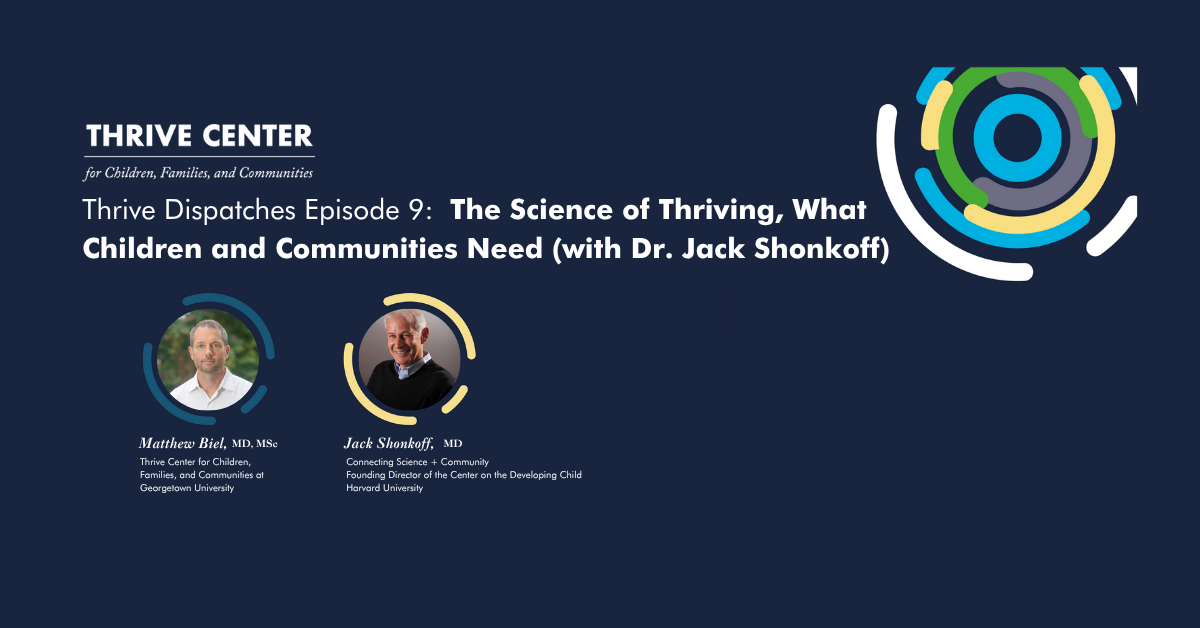Thrive Dispatches Episode 9: The Science of Thriving – What Children and Communities Need with Dr. Jack Shonkoff
Expanding the Early Childhood Ecosystem to Achieve Greater Impacts
This week on the Thrive Dispatches Podcast features a wide ranging conversation between two of the most prominent leaders in child and family mental health and well-being: Dr. Matt Biel and Dr. Jack Shonkoff, the founding director of the Center on the Developing Child at Harvard University and the current director of Connecting Science + Community: Expanding the Early Childhood Ecosystem to Achieve Greater Impacts.
For decades, Dr. Shonkoff has been at the forefront of translating complex findings in developmental science into accessible and actionable concepts that have shaped how we understand and support early childhood development. His work has given scientific credibility to the field through foundational concepts like serve-and-return interactions, toxic stress, and the buffering role of nurturing relationships.
The discussion explores what Dr. Shonkoff calls Early Childhood Development 2.0—an expanded framework that builds on decades of knowledge about nurturing relationships while addressing community-level factors and systemic barriers that affect children’s development.
Dr. Shonkoff and Dr. Biel examine how communities can harness both cutting-edge research and lived experience to create environments where all children can thrive, and why we need to better understand which approaches work for which children and why.
We hope you’ll enjoy this wide ranging, insight filled conversation. For questions, comments, or ideas for future episodes, please email us at: thrivecenter@georgetown.edu.
Summary:
In the following excerpt, Dr. Biel and Dr. Shonkoff share an optimistic view that draws parallels to Silicon Valley where disruption can lead to breakthroughs and how we might transform a period of potential crisis and resource scarcity into an opportunity for the field to become more effective, inclusive, and responsive to the diverse needs of children and families.
This interview has been edited for length and clarity.
**Matt: …**This is a time of significant disruption for all social services, but particularly for child serving, and particularly for early childhood serving systems. And so, you know, potentially, this is a time, a really good time for new vision. I’m wondering, what’s your current vision regarding the field to understanding new science, to shaping decision making as a society, with regard to early childhood?
**Jack: …**let me just make one comment about your point about disruption, Matt, because I think it’s really critical. What makes disruption the prelude to huge, positive breakthroughs in a place like Silicon Valley is that disruption is fueled by this notion of venture capital investments. Say, yeah, go rogue, and kind of really, really try to figure this out. And I’m investing in your capacity to kind of not just disrupt, but to have disruption being in the service of coming out in a much better place. That’s very different from disruption that kind of pulls the rug out from under you.
And then leaves you without any resources, to kind of figure out, so now what are you going to do?… I saw this quote in Birmingham, Alabama, in a community setting, and someone’s wearing a T-shirt that had a drawing of Nelson Mandela on it. And the quote was, which he said, “I never lose. I either win or I learn.”
So for me, the vision is to, first off, not be defensive about this, and to kind of say the early childhood field writ large has a very steep and significant knowledge base, both from science, which continues to move rapidly, especially the biological sciences, understanding, you know, how does all this stuff get into the body, and how does it affect learning, and how does it affect your physical health and mental health? And it has a rich knowledge, experienced knowledge base, of people who are not scientists, but who kind of live and breathe this as service providers, and obviously as parents and caregivers.
And so we start from a position of strength. We start from being proud of the field, not defensive about the field. And like any proud, strong field says, we want to be better. And we want to draw on all the forms of knowledge that could help us move forward. So for me, the vision would be, but this answer sounds formulaic, and it sounds kind of like milquetoast, but get beneath the surface and realize how powerful it is.
There’s huge scientific knowledge out there, a lot of it untapped and not being used for change. It’s being used to make the case for investment. There’s tremendous knowledge that does not come from scientists of people who have been working on the ground, delivering services, running service delivery systems, developing policies, and then actually working with children and families.
Let’s look more clearly at why is what’s working for some people not working for others, and not feel vulnerable and defensive, but feel like that’s what a strong organization or field does. That’s my vision, is that we be constructively critical and keep raising the bar.
Listen to the full episode
